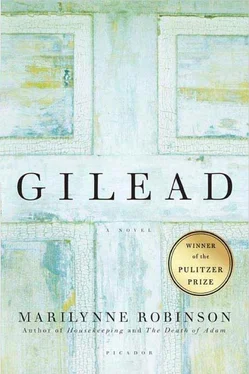He said, “When I was growing up, there were some Negro families in this town.”
I said, “Yes, there were, but they left some years ago.” “I remember hearing about a fire at their church.”
“Oh yes, but that was many years ago, when I was a boy. And it was only a small fire. There was very little damage.” “So they’re all gone now.”
“Yes, they are. It’s a pity. We have several new Lithuanian families. Of course they’re Lutheran.”
He laughed. He said, “It is a pity that they’re gone.” And he seemed to ponder it for a while.
Then he said, “You admire Karl Barth.” And I believe it was here he began to speak out of that anger of his, that sly, weary anger I have never been able to deal with. He was always smart as the devil, and serious as the devil, too. I should have known he’d have read Karl Barth.
I said, “Yes, I do admire him. Very much.”
“But he seems to have very little respect for American religion. Don’t you agree? He is quite candid about it.”
“He has been very critical of European religion also,” I said, which is true. And yet even at the time I recognized that my reply was somewhat evasive. So did young Boughton, as I could tell by his expression, which was not exactly a smile. He said, “He takes it seriously, though. He thinks it’s worth quarreling with.”
“Granted.” That is certainly true, too.
Then he asked, “Do you ever wonder why American Christianity always seems to wait for the real thinking to be done elsewhere?”
“Not really,” I said, which surprised me, since I have wondered about that very thing any number of times.
Now, at that point I did feel that Jack Boughton was, so to speak, winning the conversation, and furthermore, that he was no happier about it than I was, maybe even a little disgusted. Certainly I found myself in a false position yet again. I felt like pleading old age. But I was sitting there in my church, with the sweet and irrefragable daylight pouring in through the windows. And I felt, as I have often felt, that my failing the truth could have no bearing at all on the Truth itself, which could never conceivably be in any sense dependent on me or on anyone. And my heart rose up within me — that’s exactly what it felt like — and I said, “I have heard any number of fine sermons in my life, and I have known any number of deep souls. I am well aware that people find fault, but it seems to me to be presumptuous to judge the authenticity of anyone’s religion, except one’s own. And that is also presumptuous.”
And I said, “When this old sanctuary is full of silence and prayer, every book Karl Barth ever will write would not be a feather in the scales against it from the point of view of profundity, and I would not believe in Barth’s own authenticity if I did not also believe he would know and recognize the truth of that, and honor it, too.”
I was tired and I was feeling more beleaguered than a man my age should feel, and that is the only way I can explain the tears. I was almost as surprised as young Boughton.
He said, “I can’t tell you how sorry I am,” and he said it convincingly.
There I was, wiping tears off my face with my sleeve, just the way you do it. It was embarrassing, believe me. He said something that sounded like “Forgive me,” and he went away.
Now what? My present thought is that I will write him a letter. I have no idea what it will say.
***
There have been heroes here, and saints and martyrs, and I want you to know that. Because that is the truth, even if no one remembers it. To look at the place, it’s just a cluster of houses strung along a few roads, and a little row of brick buildings with stores in them, and a grain elevator and a water tower with Gilead written on its side, and the post office and the schools and the playing fields and the old train station, which is pretty well gone to weeds now. But what must Galilee have looked like? You can’t tell so much from the appearance of a place.
Those saints got old and the times changed and they just seemed like eccentrics and nuisances, and no one wanted to listen to their fearsome old sermons or hear their wild old stories.
I say it to my shame — it got so I didn’t really like to be with my grandfather, and that’s the truth. It wasn’t just the shabbiness, and it wasn’t just that whenever some useful object turned up missing, the owner happened by our house to mention the fact. That eye of his always seemed to me to be full of expectation and disappointment, both at once, and I began to dread the moments when it would fall on me. The old men called people who failed to embrace the great cause “doughfaces.” There is a lot of contempt in that phrase. They were harsh in their judgments. With reason, I believe.
I particularly remember one time when my grandfather was asked to say a few words at the Fourth of July celebration. I remember because it caused us all anxiety in anticipation, and then embarrassment enough to justify some part of our worrying. The idea was that since he was a sort of founder of the place in a general sense and a veteran, it would be a fitting thing to have him speak. The mayor at that time had lived in Gilead only about twenty years, and he was Swedish and a Lutheran, so he may not have heard the stories about the old times. And my grandfather rarely stole except from his family. The exceptions were pretty well limited to our own congregation and, very rarely, the most openhanded Presbyterians and Methodists, all of whom were good about keeping the matter quiet out of respect for his age and for the purity of his intent. My mother said you could tell where a Congregationalist lived by the padlock on the shed door, and there was an element of truth in that. In any case, the mayor most likely had no notion of the degree of the old man’s eccentricity when he sent the invitation.
My grandfather had a gleam in his eye from the moment he read that letter. My parents were trying to make the best of it all. My mother searched the house for his army uniform, but of course nothing was left of it but the hat, which had survived, I suppose, because it was fairly useless. “The gristle, the hooves, and the snout,” my mother would say, that being what remained of anything that in any wise came into his hands.
My mother found the cap in a closet and did what she could to shape it up a little. But the old man said, “I’m preaching,” and put it back in the closet again. I have the sermon, the ipsissima verba , because it was among the things my father buried and unburied that day in the garden. It is very brief, so I’ll copy it here as he wrote it. My father encouraged him to write it out, I remember, probably to discourage rambling, and most likely in the hope that he or my mother might get a look at it and discuss it a little with my grandfather if need be. But he kept it very close, dropping his drafts into the kitchen stove and keeping the text on his unapproachable Nazirite person.
Here is what he wrote and what he said: Children When I was a young man the Lord came to me and put His hand just here on my right shoulder. I can feel it still. And He spoke to me, very clearly. The words went right through me. He said, Free the captive. Preach good news to the poor. Proclaim liberty throughout the land. That is all Scripture, of course, and the words were already very familiar to me at the time. But it is clear enough why He would feel they needed special emphasis. No one lives by them, unless the Lord takes him in hand. Certainly I did not, until the day He stood beside me and spoke those words to me.
I would call that experience a vision. We had visions in those days, a number of us did. Your young men will have visions and your old men will dream dreams. And now all those young men are old men, if they’re alive at all, and their visions are no more than dreams, and the old days are forgotten. We fly forgotten as a dream, as it says in the old hymn, and our dreams are forgotten long before we are.
Читать дальше












